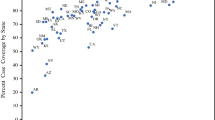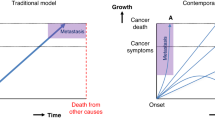Abstract
Background
Substantial resources are dedicated to long-term follow-up within cancer registries; however, the completeness of these data is poorly characterized. Our objectives were to quantify long-term cancer follow-up data completeness and the effort required to collect these data using the National Cancer Database (NCDB).
Methods
To quantify data completeness, patients diagnosed with cancer in 1989 were identified in the NCDB and loss to follow-up rates were assessed for 25 years after diagnosis. To quantify data collection effort, patients diagnosed from 1989 to 2014 who were alive and eligible for follow-up in 2014 were identified and the effort to perform patient follow-up was obtained via a survey of tumor registrars. The effort to perform follow-up beyond various intervals after diagnosis was calculated.
Results
In total, 484,201 patients at 958 hospitals were diagnosed with cancer in 1989. After 5 years, 6.5% of patients were lost to follow-up (13.1% of living patients), 50.3% were deceased, and 43.2% had ongoing follow-up. After 15 years, 22.9% were lost to follow-up (68.7% of living patients), 66.7% were deceased, and 10.5% had ongoing follow-up. By 25 years, loss to follow-up increased to 28.6% (93.7% of living patients), 69.5% were deceased, and 1.9% had ongoing follow-up. In 2014, 522,838 h were spent performing follow-up for 2,091,353 patients at 1456 hospitals who were >15 years from their initial cancer diagnosis.
Conclusions
While 5-year follow-up is excellent in the NCDB, loss to follow-up increases over time. The impact of curtailing data collection is under investigation and follow-up duration requirements will be re-evaluated.



Similar content being viewed by others
References
Bilimoria KY, Stewart AK, Winchester DP, Ko CY. The National Cancer Data Base: a powerful initiative to improve cancer care in the United States. Ann Surg Oncol. 2008;15(3):683–90.
American College of Surgeons. Optimal Resources for Cancer Care: 2020 Standards. 2020. https://www.facs.org/-/media/files/quality-programs/cancer/coc/optimal_resources_for_cancer_care_2020_standards.ashx. Accessed 23 Dec 2020.
United States Census Bureau. Lifetime Mobility in the United States: 2010. November 2011. http://www2.census.gov/library/publications/2011/acs/acsbr10-07.pdf. Accessed 4 May 2021.
Esipova N, Pugliese AJR. The demographics of global internal migration. Migration Policy Pract. 2013;3(2):3–5.
American College of Surgeons. National Cancer Database. https://www.facs.org/Quality-Programs/Cancer/NCDB. Accessed 22 Dec 2020.
National Cancer Registrars' Association. Certified Tumor Registrar. https://www.ncra-usa.org/CTR. Accessed 22 Dec 2020.
American Joint Committee on Cancer. Manual for Staging of Cancer. 3rd edn. Philadelphia: J.B. Lippincott Company; 1988.
Pinheiro PS, Morris CR, Liu L, Bungum TJ, Altekruse SF. The impact of follow-up type and missed deaths on population-based cancer survival studies for Hispanics and Asians. J Natl Cancer Inst Monogr. 2014;2014(49):210–7.
Kristman V, Manno M, Cote P. Loss to follow-up in cohort studies: how much is too much? Eur J Epidemiol. 2004;19(8):751–60.
Fewtrell MS, Kennedy K, Singhal A, et al. How much loss to follow-up is acceptable in long-term randomised trials and prospective studies? Arch Dis Child. 2008;93(6):458–61.
OCEBM Levels of Evidence Working Group. The Oxford Levels of Evidence 2. Oxford Centre for Evidence-Based Medicine. 2011. https://www.cebm.ox.ac.uk/resources/levels-of-evidence/ocebm-levels-of-evidence. Accessed 22 Dec 2020.
Howe CJ, Cole SR, Lau B, Napravnik S, Eron JJ Jr. Selection bias due to loss to follow up in cohort studies. Epidemiology. 2016;27(1):91–7.
National Center for Health Statistics. National Death Index. 2021. https://www.cdc.gov/nchs/ndi/index.htm. Accessed 31 Mar 2021.
Author information
Authors and Affiliations
Contributions
Conception or design of the work: All authors. Acquisition, analysis, or interpretation of data: Brajcich, Palis, McCabe, Nogueira, Bilimoria, Nelson. Drafting of the work: Brajcich, Nogueira, Nelson. Critical revision for important intellectual content: All authors. Drs Brajcich and Nelson had full access to all the data in the study and take responsibility for the integrity of the data and the accuracy of the data analysis.
Corresponding author
Ethics declarations
Disclosures
The authors report no conflicts of interest or financial disclosures relevant to the study.
Financial Support
Dr. Brajcich is supported by the American College of Surgeons as part of the Clinical Scholars in Residence program and by a training grant from the National Cancer Institute (T32CA247801). Funding organizations had no role in the design and conduct of the study; collection, management, analysis, and interpretation of the data; preparation, review, or approval of the manuscript; and decision to submit the manuscript for publication.
Additional information
Publisher's Note
Springer Nature remains neutral with regard to jurisdictional claims in published maps and institutional affiliations.
Supplementary Information
Below is the link to the electronic supplementary material.
Rights and permissions
About this article
Cite this article
Brajcich, B.C., Palis, B.E., McCabe, R. et al. Twenty-Five Years of Cancer Follow-Up; Is the Data Worth the Effort?. Ann Surg Oncol 29, 828–836 (2022). https://doi.org/10.1245/s10434-021-10668-w
Received:
Accepted:
Published:
Issue Date:
DOI: https://doi.org/10.1245/s10434-021-10668-w




